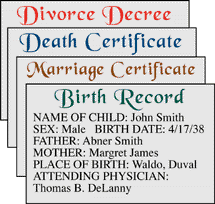|
ANALYZING DATES As you are searching for an ancestor, it is easy to pass over time-sensitive information that could provide key answers, or at least clues, to the very questions that are on your mind. It is therefore crucial that you analyze any dates associated with your ancestors. Some of the questions you might be asking yourself could be those listed below. Are any of the dates connected to a significant historical event? For example, was your father or grandfather between the ages of 18 and 50 years old during a World War? Could he have served in that war? Did you know that military records are full of vital information including dates of birth, marriage, divorce, and death?
Previous lessons taught you how and why to use historical and geographical maps in your research because they could lead you to other sources of historical value. If you have a clue that an ancestor was of draftable age, from what city or town would he have been drafted? Did you know you could search the Draft Records for World War I? Just to give you an example of some of the records available to you regarding the military, go to my business homepage www.graonline.com and notice the drop down boxes on the left. The top one helps you select a locality. For now leave that as it is. The bottom one allows you to select a record type. Select World War I military records. Do you see that there are many options available? Now select Alabama as the locality, and Civil War as the record type. Civil War Service and Pension records can only be obtained at the National Archives in Washington, D.C. Therefore, one service a genealogist can perform, is to obtain records that are not readily available for people in their areas, and to do it faster and better than the Federal Government can do it for the person. Becoming a professional genealogist requires a knowledge of record groups, how to obtain them speedily, and how to analyze them well. Don't be turned off by Web sites that cost you money. In order to obtain your business, they must educate you as well in their services--and that information is free to you. If you were to click on the Confederate Army Service Records at my business site, you would learn what information they could contain. That record would then have a link to another record that could tell you even more, and so forth, and so forth. Take the time to study the sites you will be referred to in this week's lesson and you will be richly rewarded. It is my assignment to not only prepared hobbiest to be better at their hobby, but to prepare students to become professionals capable of researching the most appropriate records in the fastest method possible. In business, time is money. Learn from those sites you visit this week more about how to be a successful genealogist. |
|
|
 One way to tell is to look at any vital records that belong to an individual. We usually start with their death certificate because that is the latest record in their life. It could lead us to earlier records. If you already have the marriage, and birth records, look at those as well. Read every line. They will include clues to other people (often called informants) and where those people lived. Death records will give clues to funeral homes, cemeteries, and other places to search for marriages, or births. What else might you notice?
One way to tell is to look at any vital records that belong to an individual. We usually start with their death certificate because that is the latest record in their life. It could lead us to earlier records. If you already have the marriage, and birth records, look at those as well. Read every line. They will include clues to other people (often called informants) and where those people lived. Death records will give clues to funeral homes, cemeteries, and other places to search for marriages, or births. What else might you notice?